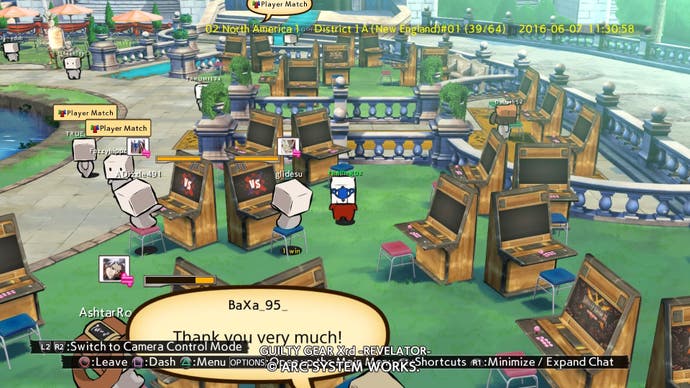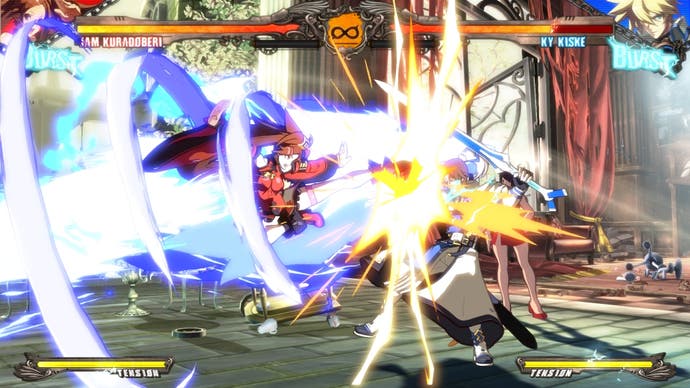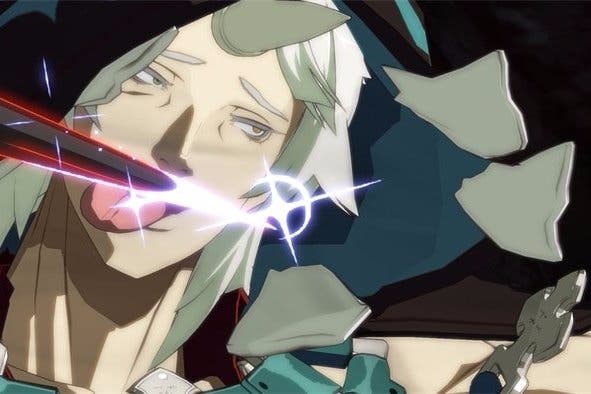Guilty Gear Xrd Revelator review
Guilty, charged.
The Guilty Gear series is driven by the unmistakeable hunger of the underdog. When series creator Daisuke Ishiwatari was a university student he obsessed over how he could design a fighting game to compete with the genre's heavyweights, Capcom's Street Fighter and SNK's King of Fighters. His solution was twofold: a thematic lunge away from martial arts into the fantasy excess of the anime tradition, and a doubling down on graphical fidelity.
Ishiwatari, who still maintains creative control over the series, harangued the artists at Arc System Works to draw the game's sprites with four times the number of pixels than any other game at the time. He made few friends at his new employer in those early months (not least because the team was working on PlayStation, with its comparatively weak 2D capability) but the results had the intended effect. Guilty Gear, in its labour-intensive workaround, offered a glimpse of a high-definition shift in games, film and TV that was still some years away. In this way, Ishiwatari's game became an overnight contender.
18 years later and, in spirit, at least, Guilty Gear has finally found dominance. Street Fighter 5's battle director Ryuichi Shigeno, a professional Guilty Gear player, cited the series as a major influence on Capcom's latest. Despite this success, Revelator does not bespeak a studio lounging on laurels: its generosity shames Street Fighter 5, which launched anaemically in February, propped up by a stack of menu beams marked 'under construction'. Revelator, by contrast, offers a tower of tutorials, challenges, playmodes and distractions, including the best online mode in its class.

The game, an update to last year's Guilty Gear Xrd Sign, does not stray from its series' defining characteristic: it is sumptuous-looking. In stills the pin-sharp sprites, each edged with a flick of black ink, imply that this is a hand-drawn 2D game. It is in fact built in 3D, a reveal its artists hold back till the moment the final blow in a match is thrown, at which point the camera bowls behind the victorious character, who flashes a grin while their opponent tumbles to the ground. Each character has been animated at 15 frames per second, a technique that preserves the feel of the 2D games. The effect is magical, at once familiar and futuristic. Its delightful effect never dulls.
A cast that's unrivalled for vivid eccentricity compounds the sense that you're starring in a combat anime. There's I-No, a red-suited witch who wields a baby blue electric guitar. There's Bedman, a bed-ridden waif whose crib sprouts Wacky Race-style spiked wheels used to run opponents over. There's cosplayer favourite Faust, whose blue shirt, yellow tie and white jacket is offset with a paper bag worn over his head, with a solitary peep hole poked through by an eager finger. All of the characters (including the downloadable extras) from 2015's game are included in the roster, alongside a clutch of others, including Jam Kuradoberi a master chef who plays most effectively at close proximity to opponents and series newcomer Jack-O'. This white-haired woman, who wears a pumpkin-shaped mask, brings with her an entirely new play-style: she's backed by three summoned servants that can be levelled up using a pipe organ during the course of the match.
While Guilty Gear has a reputation for being a complicated and difficult-to-learn game, full of special cases (see: Jack-O') it is more straightforward than Street Fighter, at least in terms of the raw numbers. There are four basic attacks to Street Fighter's six: one punch, one kick, a standard 'slash' with whatever weapon you're holding and a heavy slash - with a fifth, special attack, that can be inserted into combos. Those combos, or 'gatling combinations' as they're called in Guilty Gear's ludicrous terminology, work in a similar way to Capcom's Marvel vs. Capcom series: you can only chain a weak attack into a stronger attack. Tap 'punch' to 'kick' to 'slash' to 'heavy', for example, and you have a basic four-hit combo that carries across every character.
If you have enough meter (a bar which is filled both by landing attacks on your opponent as well as simply walking forward) you can press three attack buttons simultaneously at the end of this combo to 'reset' the progression, a technique known as a 'Roman cancel', allowing you to continue the string of attacks by returning to a weaker hit and working your way back up again. This essential building block can be ornamented with all manner of special moves, counters, cancels, air combos and so on.

Guilty Gear's reputation derives from its hectic appearance. Newcomers will no doubt be giddied and dazzled online, where 64-player lobbies maintain an almost even flow of matches. But Arc System Works' studious tutorials and challenge vignettes allow any player with some basic fighting game competence to compete far more quickly than in some, ostensibly simpler, rivals. A basic control scheme option further levels the playing field between beginner and expert.
Other than extra-curricular distractions, including a fishing game where you unlock artwork and costumes, M.O.M. mode offers the best and most unusual arena. Here you choose opponents to battle from the character selection screen, each of whom is subject to different status effects and special case rules. Wins earn currency that can be spent on stat boosts and perk-granting accessories, while the stages themselves are lumpy with traps and bonuses.
For veterans of Sign, especially those who purchased its add-ons, Revelator is a less essential purchase. It offers a slew of minor balances (such as throw breaks, when both players try to throw one another simultaneously, and tweaks to the powerful Blitz Shield, which can be used to counter any normal or special move in the game.) But for those who overlooked this admittedly kooky series, Revelator offers the perfect opportunity to witness and admire the noble efforts of a team that continues to work harder than any of its rivals to keep its series fighting fit.










